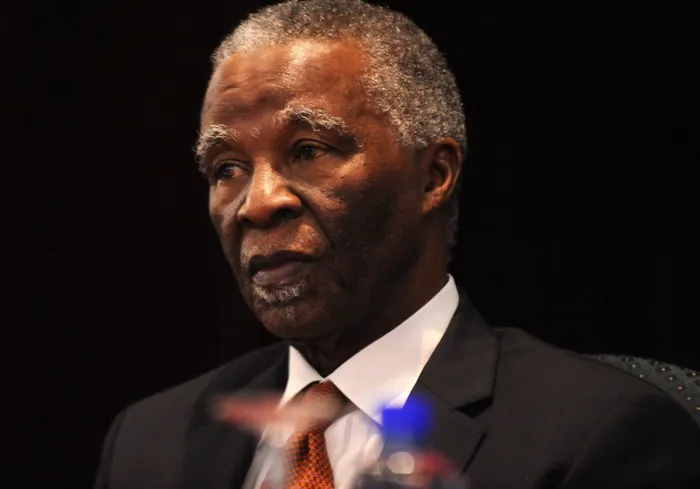Thabo Mbeki urges African governments to prioritise history education

Reviving African history: Thabo Mbeki's call for educational reform.
Image: Boxer Ngwenya
FORMER South African President Thabo Mbeki has called on African governments to take decisive steps to revive and emphasise the teaching of African history in schools to avoid repeating past mistakes.
His appeal comes amid concerns that the continent’s youth, lacking historical awareness, risks repeating past mistakes that have hindered development and unity.
After delivering the annual Thabo Mbeki Lecture in Dar es Salaam, Tanzania, Mbeki emphasised the importance of fostering a shared understanding of Africa’s struggles, victories, and the lessons learned.
In an interview with Dr Mbuyiseni Ndlozi on Power FM on Monday, he highlighted the critical role that historical education plays in promoting African unity and resilience.
Mbeki underscored the need for "African unity and solidarity," asserting that acting together is essential to confront the continent’s ongoing challenges.
“We must collaborate to find solutions,” he said. “The foundation of this effort lies in understanding our shared history — the struggles, sacrifices, and triumphs that have shaped us.”
He praised the role of the Thabo Mbeki Foundation and initiatives dedicated to the continent’s renaissance, noting that these efforts are vital for fostering a sense of pride and identity among young Africans.
"The Foundation must be committed to the renaissance of Africa and South Africa,” he added. “This entails capturing and transmitting our history to future generations.”
Mbeki recounted the importance of documenting the history of democracy in South Africa and beyond.
“The actors, those who fought for freedom, must tell their stories directly,” he said.
“We established projects like the South African Democratic Education Transfer to ensure that the history of our struggle is accessible and accurately conveyed.”
He also pointed out that this initiative extends beyond South Africa, incorporating the broader anti-apartheid movement and global solidarity efforts involving Cuba, Brazil, India, Russia, and others.
“We’ve decided to develop textbooks tailored for high school students to make this vast knowledge accessible and engaging for young people,” Mbeki explained.
“It’s essential that they understand the history from those who lived it, rather than only through secondary sources.”
Mbeki expressed concern that many young Africans, including Tanzanian youth, are unfamiliar with their history.
He cited observations from Tanzanian leadership about the forgetting or neglect of key moments in the country’s independence and liberation.
“This is problematic,” he said. “If young people are unaware of their history, they risk repeating past mistakes.”
He urged governments and educational institutions to prioritise history education, emphasising that the issue is not a lack of interest but a failure to provide adequate resources and curricula.
“It’s our responsibility to ensure that history is part of public education,” he asserted.
“Young people are not uninterested; they simply need access and engagement.”
Mbeki’s remarks serve as a clarion call for a renewed focus on African history education.
He emphasised that cultivating historical consciousness is essential for building a unified and resilient continent.
“We must empower our youth with the knowledge of their past,” he concluded.
“Only then can they make informed decisions and avoid the mistakes of previous generations.”
Mbeki suggested that governments, educators, and civil society ensure that Africa’s story is not lost but celebrated and learned from.
Related Topics: